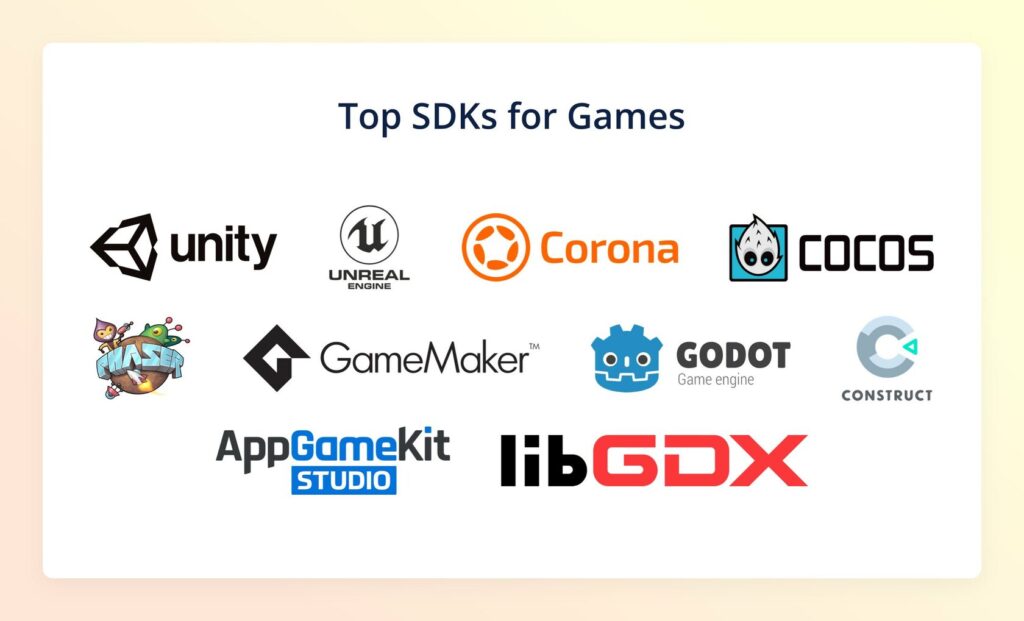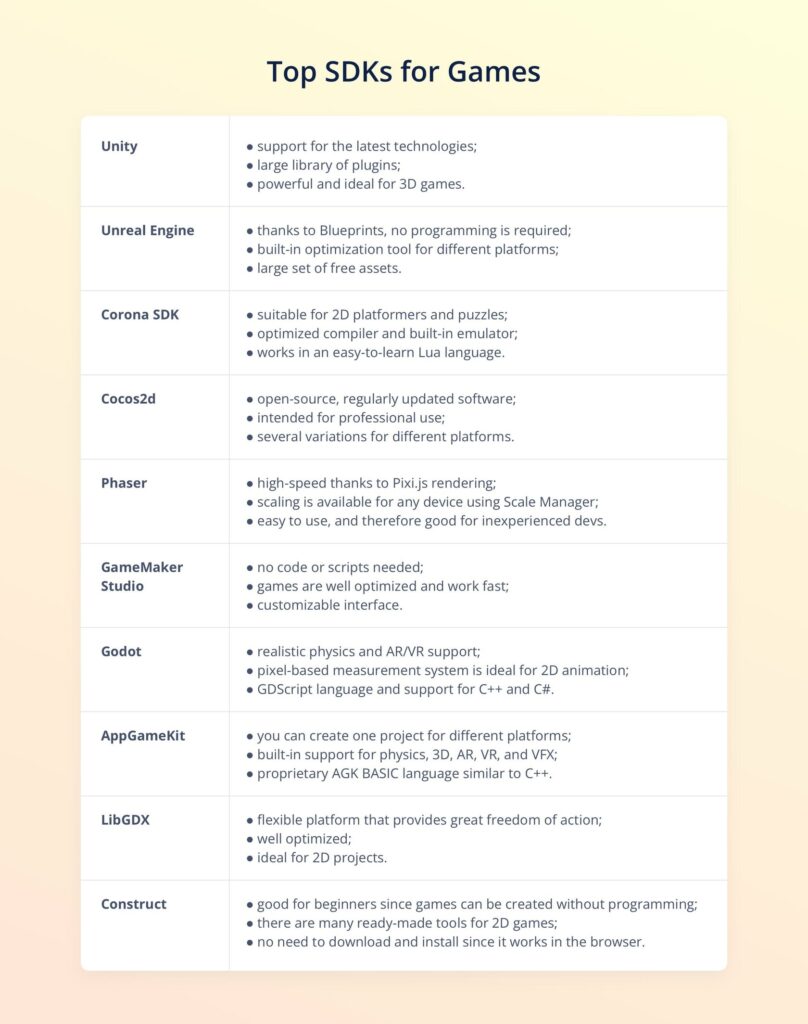According to the current statistics, in 2023, the total number of gamers worldwide exceeded 3 billion people. At the same time, mobile games comprise half of the global gaming industry. Such a large audience is a great chance for every developer to prove themselves. If you dream of conquering this market, you should know that development begins with choosing the right game SDK.
Engines and platforms have different libraries, tools, guides, samples, and APIs. You should know each of them to understand which one will empower you to perform your tasks. This article will briefly discuss what an game SDK is as well as focus on describing the ten most popular tools. After reading the material, you will be able to choose the ideal base for your own game.
Table of Contents
What Is a Game SDK?
Before moving on to SDKs, let’s understand what they are. What does SDK stand for? It is a Software Development Kit that contains the tools necessary for app and game development. You can use SDKs not only to create products from scratch but also to improve existing ones. For example, there are advertisement kits with which you can monetize your app. If you are interested in monetization, we recommend reading more about mobile game monetization after reading this material.
Using SDKs for your development has many undeniable advantages:
- faster integration of the new necessary elements;
- acceleration of the development process from scratch;
- efficient app scaling;
- saving money and labor costs;
- protection against unauthorized access;
- convenient performance monitoring.
In general, such tools help optimize workflow, which is beneficial in developing any project.
Top 10 App Game SDK
The SDK can be called the foundation for mobile games and apps. However, before starting development, you should get deep market intelligence analytics with an overview of competitors and target audiences. It’s the only way to create a great game based on the best game SDK. Now let’s go from mobile SDK definition to the overview of engines and platforms.

- Unity
Unity is one of the most commonly used engines for creating various games. According to the company’s 2022 report, its use has grown by more than 30% compared to the last year. Thanks to tons of educational materials and a big community, novice developers can use Unity for mobile games without issues. Pokemon GO, Hexagonium, Monument Valley 2, COD: Mobile, and Alto’s Adventure were built on it.
Unity is good at game improvement because it adheres to the component-oriented approach to development, supports complex latest platforms, effects, and technologies such as ray trace, and has a huge library of ready-made assets and plugins. - Unreal engine
Games built on this mobile game engine, such as The Callisto Protocol, Stray, and Ark 2, have received honorary awards, hence users’ attention. It supports more platforms than Unity and allows you to create 3D projects using Blueprint visual scripting. Mobile games written on this platform include Fortnite, Hello Neighbor, Life Is Strange, and Mortal Kombat.
Unreal Engine offers the broadest opportunities for creating unique game worlds. It provides a BluePrint visual programming system, allows you to quickly create game prototypes (with post-processing), and is distributed for free. - Corona SDK
If you’re looking for how to make game apps in a 2D format easily, pay attention to the completely free Corona SDK. It allows you to build cross-platform projects with excellent performance using the Lua language. It lets you create full-scale commercial projects and learn the basics of game programming. Game of Sultans, I Love Hue, Rider, and Day R are based on this engine.
Corona SDK is designed to create 2D games and mobile apps. Its main advantage among better-known analogs is the simplicity of use due to work in an easy-to-master Lua language. - Cocos2d
Cocos2d is another open-source engine for game app development. It has several branches targeting different platforms. For mobile games, Cocos2d-x is the most commonly used. Released in 2021, Cocos Creator allows you to create not only 2D but also 3D projects. Regular updates give developers more options for working with lighting, reflections, marionettes, and more. Badland, Plague Inc., FarmVille, and Geometry Dash are based on it.
The open-source Cocos2D allows you to create 2D games and interactive applications (for example, for training). The framework has high performance, is completely cross-platform, and provides excellent architecture. - Phaser
Phaser is a handy HTML5 framework for creating 2D games. It has WebGL and Canvas for rendering, three physics systems, a visual editor and sandbox, classic sprite animations, a scaling tool, an Arcade particle system, and more. It’s lightweight, fast, and suitable for beginners who want to figure out how to make a game app from scratch. Idle Zoo, Jungle Runner, and Fishing.io were written on this engine.
The HTML5 Phaser engine offers high speed and simple scaling for different devices and is easy to use. It was intended to make HTML5 games but also allows you to create projects for mobile devices. - Game Maker Studio
GameMaker Studio is another cross-platform 2D project creation tool we can recommend to beginner developers as you can work with it without codes or scripts. You get access to an internal store with ready-made sprites, graphics cards, soundtracks, objects, etc. Super Chicken Jumper, Katana Zero, and Forager were made with it.
GameMaker Studio offers a customized graphic interface, cross-platform features, and a low price. A huge plus for beginners is an extensive community and detailed documentation, which is regularly updated. - Godot
With this cross-platform open-source game engine for app development, you can create both 2D and 3D projects. It supports realistic graphics, AR/VR, and procedural generation, allows you to work with animation and a navigation grid, provides its own GDScript language, and much more. Thanks to the pixel-based measurement system, it’s ideal for creating 2D animations. Haiki, Rings of Saturn, Resolution, and Endoparasitic were built with it.
Godot is suitable for creating and improving 2D and 3D games for mobile devices, PCs, and web platforms. With its help, you can introduce VR and AR Elements into the project and use realistic physics engines and procedural-level generation. - AppGameKit
Based on AppGameKit, you can create both apps and 2D games with 3D elements. It uses AGK BASIC, a language similar to C++, so you don’t need to study the engine deeply to learn how to code an app game. The advantage of this engine is cross-platform and the opportunity to first create a project and then choose a platform. It is used for games such as Repton 2, Slaughter School, Na4, and Bouncing Brendan.
AppGameKit does not require extra programming skills from you. With its help, amateurs and beginners can create and deploy 2D games that include 3D, AR, and VR elements. - LibGDX
Building a game for Android using LibGDX is a pretty straightforward process. This free engine has a low entry threshold thanks to its own extensive Wiki, but it requires coding and Java skills from users. Paperama, A Stone Pillar, Slay the Spire, and Disney Heroes: Battle Mode are created using LibGDX.
The free LibgDX platform works in Java and has a huge user community. It is quite flexible and well-optimized for creating fast-working 2D games. - Construct
Construct is what beginners need to get their heads around building a mobile game. This platform is designed to create 2D projects even if you don’t have programming skills. Thanks to the virtual scripting system, block system, and sprite animation, you can quickly make a simple puzzle or pixel art platformer. It is based on Beast Attack, Lunar Mission, and Artillerists Needs Your Help.
Using Construct, you can create a 2D game without writing a single line of code. Thanks to it, you can quickly implement any idea and publish a finished product in digital stores in a few clicks.

Technical Aspects You Should Know Before Creating a Mobile Game
Our list includes multi-platform SDKs. Some of them are more popular, some less. You will find projects created using different engines in any list of the best app games. To understand what is right for you, consider the following nuances:
- personal skills and professionalism;
- programming language and platform;
- the size of the team that will work on the game;
- time frame and deadlines;
- budget;
- genre, and so on.
Also, when choosing an engine or platform, it is extremely important to pay attention to data security. To avoid endangering clients, follow the standard requirements for using SDKs. For example, the Play Store has clear guidelines for this matter.
Finding a universal solution that suits every developer is tricky, so you need to consider the above features. The choice of platform largely affects the product’s quality, which in turn affects users’ interest and involvement. Use game SDK not only for development but also for monitoring app performance. In our ASO blog, you can read more about mobile gaming metrics.
Final Thoughts on Choosing SDK for Your Game
We have not described all the existing SKDs, but the mentioned engines allow you to create games from scratch. However, there is also software with which you can improve a current project. For example, you can use Unity Ads, IronSource, or Applovin for monetization and ads, and MOAT Analytics, AppsFlyer, and Crashlytics for getting usage data.
There are free and paid game SDKs. When choosing the right option for you, do not rush to conclusions and do not refuse paid ones if you are on a budget. We recommend that you take advantage of the trial versions of the platforms that suit you and see what works well for you. While free solutions save money in the first place, paid ones tend to be better optimized and offer out-of-the-box tools for scaling and porting apps, so they can be more profitable in the long run. It all depends on the complexity of your project and plans for further development.




